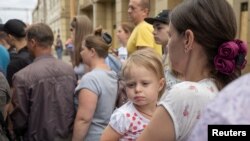The Russian leader met with his Belarussian counterpart, Alexander Lukashenko, Saturday in St. Petersburg, where Lukashenko told Putin that Belarus is concerned by the "aggressive" and "confrontational" policies of its neighbors Lithuania and Poland.
He asked Putin to help Belarus respond to what he said were nuclear-armed flights by the U.S.-led NATO alliance near Belarus's borders. Iskander-M systems have a range of up to 500 kilometers and can carry both conventional and nuclear warheads.
The news followed reports from Ukraine’s northern military command that Russia had fired 20 rockets from Belarus, targeting the village of Desna in the northern Chernihiv region. In addition to rockets launched from the ground, Ukraine's air command said Russian long-range Tu-22 bombers were deployed from Belarus for the first time. The neighboring country hosts Russian military units and was used as a staging ground before Russia invaded Ukraine, but its own troops have not yet crossed the border.
Ukraine military intelligence said the attack was directly linked to Moscow’s effort to pull Belarus into the war.
To the west, Russian rockets hit a “military object in Yavoriv, Lviv regional governor Maksym Kozytskyy said. He did not give further details of the target, but Yavoriv has a sizable military base used for training fighters, including foreigners who have volunteered to fight for Ukraine.
About 30 Russian rockets also were fired on the Zhytomyr region in central Ukraine Saturday morning, killing one Ukrainian soldier, regional governor Vitaliy Buchenko said.
Ukraine’s nuclear regulatory inspectorate reported that Russian shelling damaged a nuclear research facility Saturday in the northeastern city of Kharkiv. In an online post, it said the strike damaged some of the site's buildings and infrastructure, but it did not affect the area housing nuclear fuel. For now, it said radiation levels remain within the normal range.
"The probability of new damage ... which can directly affect the state of nuclear and radiation safety, remains high due to shelling by Russian troops," it cautioned.
Sievierodonetsk falls
Sievierodonetsk mayor Oleksandr Stryuk appeared on national television Saturday to say that Russian forces now fully occupied the city, which, after weeks of heavy shelling, is largely in ruins.
Luhansk regional governor Serhiy Haidai said Saturday on Facebook that Russian and separatist fighters were now trying to blockade nearby Lysychansk from the south. The two cities and surrounding areas are the focal point of an offensive aimed at capturing all of eastern Ukraine’s Donbas region.
Russia's Interfax news agency quoted a spokesman for the separatist forces, Andrei Marochko, as saying Russian troops and separatist fighters had entered Lysychansk and that fighting was taking place in the heart of the city. There was no immediate comment on the claim from the Ukrainian side.
Ukrainian President Volodymyr Zelenskyy is slated to speak via video link to Western allies at a G-7 summit in Germany on Sunday, as well as to a NATO summit in Madrid next week. U.S. President Joe Biden will attend both meetings.
A senior White House official said Wednesday that Biden will discuss with G-7 leaders U.S. proposals for increasing pressure on Russia, and he will address the impact of the Ukraine war on global energy and food prices.
Some information in this report came from The Associated Press and Reuters.








